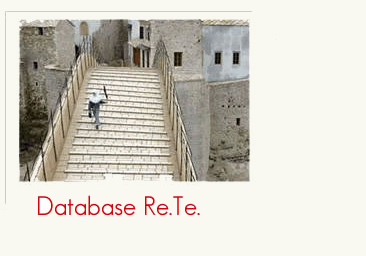Data inizio: 01/05/2003
Data fine: 01/01/2006
Ente finanziatore: Ministero degli Affari Esteri italiano
Unità operativa: OBC Transeuropa

Progetto realizzato nell'ambito del Programma Seenet I – "I governi locali motori dello sviluppo", avviato dal 2003 al 2006 e promosso dalla Regione Toscana e dalla Regione Istriana e cofinanziato dal Ministero degli Affari Esteri italiano. [2003]
OBC ha realizzato il Database Re.Te. uno strumento per esplorare e fotografare la realtà della cooperazione decentrata italiana con il sud-est Europa. Il database raccoglie i progetti realizzati nell'area e gli accordi territoriali sottoscritti dagli enti locali sulle due sponde dell'Adriatico. Le relazioni che legano i territori italiani e balcanici sono ricercabili nel database in forme aggregate.




